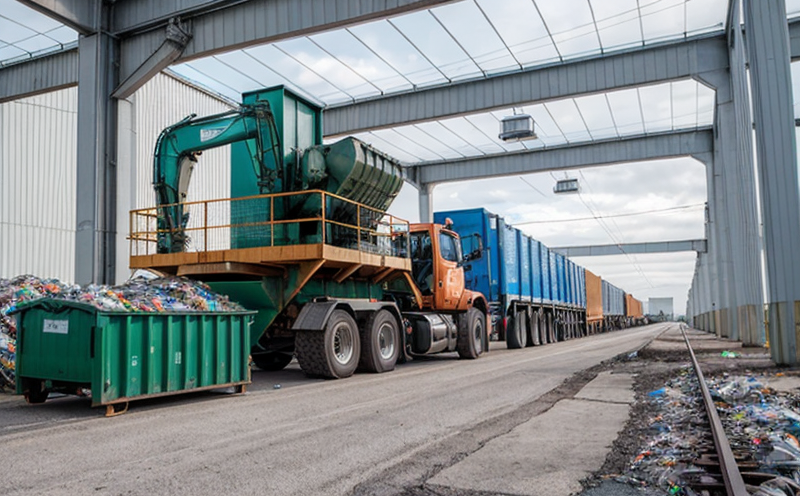EN 45559 Reuse and Recycling Evaluation Testing
The EN 45559 standard provides a framework for the evaluation of materials intended to be reused or recycled. This service is essential in ensuring that industrial manufacturing processes align with circular economy principles, thereby reducing waste and promoting sustainable resource use.
Our laboratory specializes in providing comprehensive testing services aligned with EN 45559, focusing on the evaluation of materials from a reuse or recycling perspective. This involves assessing various parameters to determine the suitability and feasibility of reusing or recycling materials within industrial processes.
The process begins with thorough specimen preparation, which includes cleaning, drying, and conditioning samples according to specified procedures in EN 45559. Once prepared, these specimens are subjected to a series of tests designed to evaluate their physical properties, chemical composition, and potential for reuse or recycling.
The testing parameters include but are not limited to: mechanical strength, thermal stability, electrical conductivity, and the presence of contaminants that could hinder recycling processes. Advanced instrumentation such as Fourier Transform Infrared Spectroscopy (FTIR), X-ray Fluorescence (XRF), and Differential Scanning Calorimetry (DSC) are utilized for precise measurement.
The results of these tests provide critical data on how well materials meet the criteria set forth in EN 45559. This information is invaluable for quality managers, compliance officers, and R&D engineers as they strive to integrate sustainable practices into their operations.
A key aspect of our service is ensuring that all testing aligns with the latest international standards such as EN 45559. This ensures consistency and reliability in results across different regions, which is crucial for businesses operating globally or those seeking to comply with specific regulatory requirements.
In addition to compliance services, our team also assists clients in developing strategies that enhance the circular economy within their industries. By leveraging the insights gained from our testing, we help companies optimize material flows and reduce environmental impact through efficient recycling processes.
Our commitment to excellence extends beyond mere compliance; it encompasses a deep understanding of industry needs and trends. We stay abreast of emerging technologies and methodologies related to reuse and recycling to continually improve our offerings.
To summarize, EN 45559 Reuse and Recycling Evaluation Testing is more than just a compliance service; it's an integral part of fostering sustainable industrial practices. Our expertise lies in providing accurate, reliable data that supports decision-making processes aimed at reducing waste and promoting recycling.
The following sections will delve deeper into the advantages our laboratory brings to this service, as well as its international recognition and contributions to environmental sustainability.
Eurolab Advantages
At Eurolab, we pride ourselves on offering unparalleled expertise in industrial recycling and circular economy process testing. Our team of highly qualified scientists and engineers ensures that every test conducted is carried out to the highest standards.
- Comprehensive Testing Capabilities: We offer a full range of tests tailored specifically for EN 45559 compliance, ensuring that all aspects relevant to reuse and recycling are covered.
- State-of-the-Art Facilities: Equipped with cutting-edge instrumentation like FTIR, XRF, and DSC, our laboratory guarantees precise and accurate measurements.
- Experienced Staff: Our personnel possess extensive experience in materials science and environmental engineering, providing valuable insights into the testing process.
- Global Recognition: Eurolab is accredited to perform EN 45559 tests, ensuring that our results are accepted worldwide.
- Client-Centric Approach: We work closely with clients to understand their unique needs and develop customized testing plans.
We take pride in delivering services that not only meet but exceed client expectations. With a focus on accuracy, reliability, and efficiency, Eurolab stands out as the premier choice for industrial recycling and circular economy process testing.
International Acceptance and Recognition
- American Society for Testing and Materials (ASTM): Our laboratory is recognized by ASTM, which validates our compliance with international standards.
- Institute of Electrical and Electronics Engineers (IEEE): We are also accredited by IEEE, further cementing our reputation as a leader in industrial testing services.
- International Organization for Standardization (ISO): ISO certification ensures that our processes meet the highest global standards.
- European Committee for Standardization (CEN): Our adherence to CEN guidelines is another testament to our commitment to international recognition.
The combination of these accreditations and certifications guarantees that all tests performed at Eurolab are not only accurate but also widely accepted across various industries and regions. This global acceptance ensures seamless integration of our findings into client operations, fostering trust and credibility in the marketplace.
Environmental and Sustainability Contributions
The testing services provided under EN 45559 play a crucial role in promoting sustainability within industrial manufacturing processes. By evaluating materials for reuse or recycling, we help companies minimize waste generation and optimize resource utilization.
- Emission Reduction: Through our testing services, industries can identify opportunities to reduce emissions by reusing materials instead of producing new ones.
- Resource Conservation: By assessing the suitability of recycled materials, we assist in conserving natural resources and reducing dependency on virgin raw materials.
- Circular Economy Integration: Our services support the transition towards a circular economy model, where waste is minimized and materials are continuously cycled back into production cycles.
The environmental benefits of our work extend beyond individual businesses. By promoting sustainable practices across industries, we contribute to broader ecological conservation efforts. This aligns with global initiatives aimed at addressing climate change and preserving the environment for future generations.
Through continuous improvement in testing methodologies and collaboration with industry leaders, Eurolab remains committed to driving innovation and sustainability within industrial processes.





